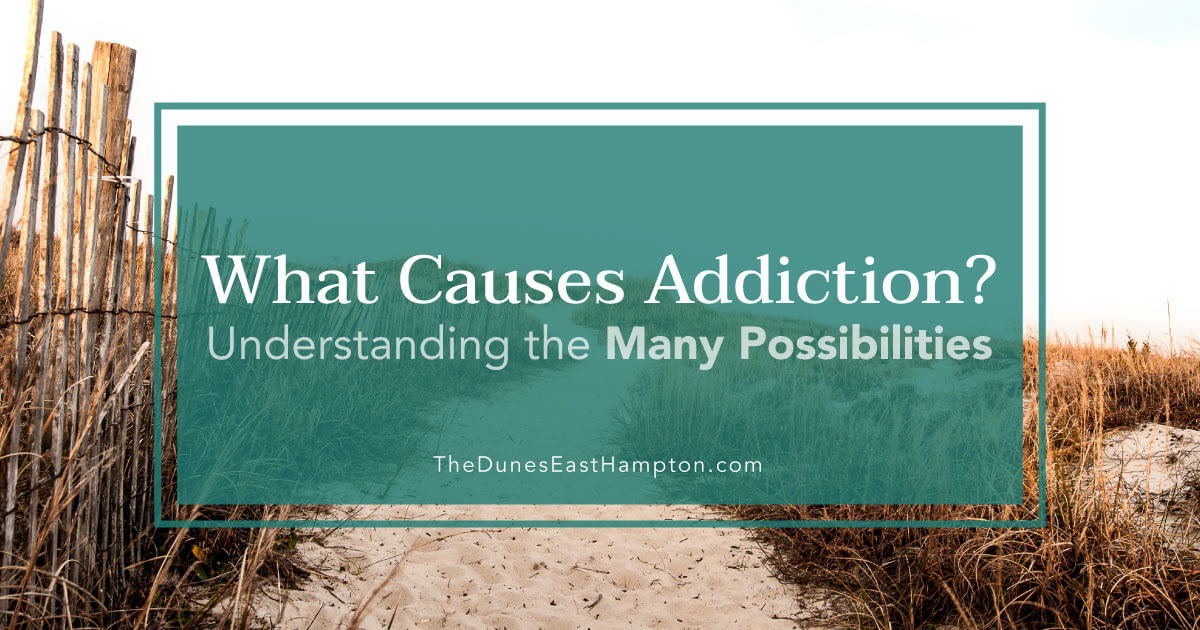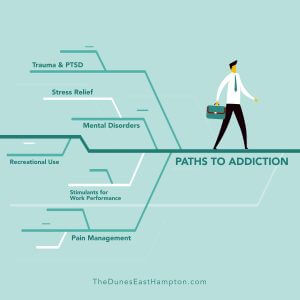
No one aspires to become addicted. Addiction happens as the result of other factors in a person’s life that go unresolved. Substance use starts out as a temporary solution, and then becomes a problem in and of itself.
In fact, even when deep into the grips of addiction, a person is often oblivious to the fact they are addicted, finding all sorts of explanations to excuse behavior that, to outsiders, is clearly unhealthy and destructive.
What makes understanding addiction difficult is that there is no single cause of addiction, and it can be expressed in a multitude of ways, which vary with each individual. Often well-meaning friends and family try to intervene and help their addicted loved one, but without a full understanding of the complexity of addiction, they may end up enabling rather than helping.
While a single blog post is insufficient to fully understand this complex topic, we can begin by looking at the six major factors that can lead to addiction.
The 6 Underlying Causes of Addiction
As we review the six major factors that can cause addiction, keep in mind the following:
- Some people may become addicted due to multiple causes.
- The more of these situations a person experiences simultaneously, the greater their risk of becoming addicted.
- Some people become addicted to substances like drugs or alcohol, while others engage in behavioral addictions such as gambling and overeating.
- Addiction results from both physical/chemical affects of substances as well as mental and emotional patterns, all of which interact to reinforce existing patterns of behavior.
- Not everyone who experiences these causal situations necessarily ends up suffering from addiction. Some are able to cope with suffering in healthy ways either on their own or with professional help.
- Not all addictive substances and activities result in addiction. For example, some people can drink, gamble, or smoke marijuana without getting addicted. While those activities may be relatively harmless for some people, they can lead to addiction for others.
- The specific way that addiction manifests for each person is unique to that person, and therefore any treatment plan must also be customized to that individual.
1. Recreational Use
Some people’s addiction can be traced back to casual use of a substance simply for the mood-altering effects of the substance and/or to be accepted by peers.
While such experimentation may seem innocent enough in the moment, even one such experience can begin altering brain chemistry in ways that can ultimately lead to addiction.
Recreational use can also show the user that this is a way to deal with one of the other causes listed below.
Finding relief from a substance may fill the need to the point that the person doesn’t bother seeking help from other sources for their underlying psychological distress.
2. Work Stimulants
Many people in careers with long hours and high expectations turn to stimulants to push their bodies to continue performing beyond normal limits. Whether using legal stimulants like caffeine and energy drinks, or misusing ADHD medications like Adderall, these people can become addicted to these substances for daily functioning.
Not only do the stimulants themselves have adverse health effects, but the lack of proper sleep and nutrition these people experience also takes a physical toll on the body.
3. Stress Relief
Stress can be caused by heavy obligations and conflict at work, at home, and in relationships. Prolonged stress causes emotional unrest and physical tension that many people alleviate by turning to drugs, alcohol or other addictive behaviors like excessive TV watching.
In fact, in movies and TV, substance use is often portrayed as simply the way people deal with stress, making it seem like a natural thing to do.
Over an extended period of time, using substances to deal with stress can lead a person slowly into full-blown addiction.
4. Pain Management
The opioid epidemic, in particular, is primarily caused by people becoming addicted to prescription opiate and opioid medications. While effective for short-term acute pain relief, such as after surgery or a car accident, these medications should not be used for long-term chronic pain because they are highly addictive.
People who suffer from other causal factors on this list, or anyone who has suffered from addiction in the past, should be especially wary of taking opioid pain medication. Ask your doctor about alternative pain-management methods.
5. Coping with Trauma, PTSD and Purposelessness
Any mental or emotional pain, whether caused by something as simple as bullying or as acute as post-traumatic stress disorder (PTSD), can trigger a person to turn to addictive substances for relief.
Another cause that people rarely think about is purposelessness. Human beings have an instinctive need to feel that their lives have value and meaning. When a person feels trapped in the rat race or a meaningless day-to-day existence, they may turn to substances to 1) fill the emotional void, 2) escape from reality and 3) experience the temporary pleasure that some substances and activities provide.
6. Mental Disorders
People who suffer from mental disorders such as depression, anxiety, ADHD and bipolar disorder may self-medicate with drugs and alcohol. Oftentimes, they are unaware that they are doing this, since they usually think they are consuming the substances simply for recreational purposes or stress relief.
How to Treat the Many Expressions of Addiction
Effective addiction treatment – the kind that leads to long-term recovery – must address both the physical and psychological aspects of addiction. It must not only get the person sober, but also address the underlying cause(s) of the addiction. And because the causes and expressions of addiction are unique to each person, the treatment plan should be customized for each individual for maximum effectiveness.
A treatment plan may include any of the following interventions that directly address the root causes of addiction:
- Expose the client to healthy ways of having fun and experiencing pleasure without addictive substances.
- Evaluate work and personal situations and create a plan to substantially reduce or eliminate sources of stress.
- Educate the client on healthy alternatives for handling stress and pain when such situations are unavoidable.
- Provide therapy to overcome psychological trauma, heal emotional wounds and learn to engage in healthy self-care.
- Provide counseling to help the person reconnect with their passions and identify what gives their life purpose, then empower them to pursue those things.
- Provide appropriate treatment for mental disorders that rely as little as possible on any substance or activity that could become addictive.
How You Can Help Prevent Addiction
An ounce of prevention is worth a pound of cure. We need to be on the lookout for the situations that can trigger addiction and provide help for our loved ones (and ourselves!) before problems turn into addiction.
Compassion is essential. We need to rethink our tendency to expect people to handle their problems on their own and simply “deal with it” or “get their act together.” All too often, the way people “deal with it” is to turn to an addictive substance or activity.
This happens because:
- They don’t know what else to do, and
- They’re often not consciously aware of the dangerous path they’re heading down.
The bottom line: We need to empower people with education and counseling early on to prevent addiction.
Next Steps If You or a Loved One Suffer from Addiction
The ultimate goal of addiction treatment is two-fold:
- Help the person get sober, and
- Help them experience a happy, meaningful life on a day-to-day basis.
When a person has the skills to handle stressful situations in constructive ways, find healthy ways to experience enjoyment, and discover a purpose that drives them forward with passion, addiction can be avoided.
Contact The Dunes East Hampton to speak to one of our addiction specialists about your particular situation and learn about the type of treatment plan that would be appropriate for you or your loved one.








